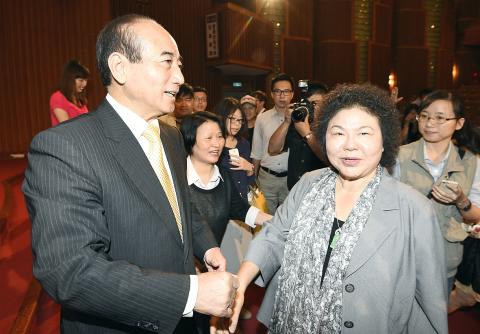Legislative Speaker Wang Jin-pyng (王金平) yesterday said that he has not talked to People First Party (PFP) Chairman James Soong (宋楚瑜) for more than a year, in response to rumors that the two are planning to pair up for January’s presidential election.
The Liberty Times (the Taipei Times’ sister newspaper) cited an anonymous source alleging that Wang and Soong have been conversing “on a hotline” about potential collaboration for the next year’s presidential election, with Wang as the presidential candidate and Soong as his running mate.
Wang, a member of the Chinese Nationalist Party (KMT), dismissed the report yesterday, calling it “someone’s unrealistic imagination.”

Photo: Chen Chih-chu, Taipei Times
“I have not talked to Chairman Soong face-to-face or over the phone for at least a year,” Wang said.
PFP spokesman Clarence Wu (吳崑玉) also denied there are ongoing talks between the two, saying that similar rumors have been flying around for months, but that none of them are true.
He asked the media not to “take advantage of Wang,” saying that the PFP would respect Wang’s decision on his next move.
Regarding the meeting said to be planned between Soong and KMT chairman Eric Chu (朱立倫), Wu said that because the secretary-generals of the two parties are longtime acquaintances, it is easy for the two party leaders to meet up.
However, Wu said that because a meeting between the two would be criticized as “negotiations behind closed doors” if undertaken otherwise, the PFP has requested the meeting to be open to the public.
However, the KMT has not agreed to that, leaving the matter in limbo, Wu said.
Chu yesterday said that there would be no public Chu-Soong meeting, as he had already made clear, but he would keep discussing various issues with Soong.

Taiwan is stepping up plans to create self-sufficient supply chains for combat drones and increase foreign orders from the US to counter China’s numerical superiority, a defense official said on Saturday. Commenting on condition of anonymity, the official said the nation’s armed forces are in agreement with US Admiral Samuel Paparo’s assessment that Taiwan’s military must be prepared to turn the nation’s waters into a “hellscape” for the Chinese People’s Liberation Army (PLA). Paparo, the commander of the US Indo-Pacific Command, reiterated the concept during a Congressional hearing in Washington on Wednesday. He first coined the term in a security conference last

A magnitude 4.3 earthquake struck eastern Taiwan's Hualien County at 8:31am today, according to the Central Weather Administration (CWA). The epicenter of the temblor was located in Hualien County, about 70.3 kilometers south southwest of Hualien County Hall, at a depth of 23.2km, according to the administration. There were no immediate reports of damage resulting from the quake. The earthquake's intensity, which gauges the actual effect of a temblor, was highest in Taitung County, where it measured 3 on Taiwan's 7-tier intensity scale. The quake also measured an intensity of 2 in Hualien and Nantou counties, the CWA said.

The Overseas Community Affairs Council (OCAC) yesterday announced a fundraising campaign to support survivors of the magnitude 7.7 earthquake that struck Myanmar on March 28, with two prayer events scheduled in Taipei and Taichung later this week. “While initial rescue operations have concluded [in Myanmar], many survivors are now facing increasingly difficult living conditions,” OCAC Minister Hsu Chia-ching (徐佳青) told a news conference in Taipei. The fundraising campaign, which runs through May 31, is focused on supporting the reconstruction of damaged overseas compatriot schools, assisting students from Myanmar in Taiwan, and providing essential items, such as drinking water, food and medical supplies,

New Party Deputy Secretary-General You Chih-pin (游智彬) this morning went to the National Immigration Agency (NIA) to “turn himself in” after being notified that he had failed to provide proof of having renounced his Chinese household registration. He was one of more than 10,000 naturalized Taiwanese citizens from China who were informed by the NIA that their Taiwanese citizenship might be revoked if they fail to provide the proof in three months, people familiar with the matter said. You said he has proof that he had renounced his Chinese household registration and demanded the NIA provide proof that he still had Chinese